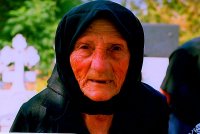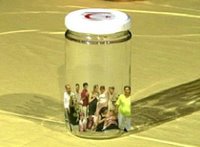Through the Looking Glass:
Remembering a Greek Tragedy
Part 2: How Happy To Say I'm a Turk > >
“Do you see this?” The driver leaned toward me, his index finger tracing the pattern of an ancient scar on his nose. “I was taken to a Turkish prison during the coup and beaten. This is what I got.” I asked my taxi driver, the proverbial journalist’s first source, what he planned to do to commemorate the anniversary of the coup that day. “Bah!” he exclaimed, waving dismissively. “I’ve forgotten about all of that. We are part of Europe now. Better to forget. I am happy to be alive.”
He left me across the street from the Agios Konstantinos and Agia Eleni cemetary, which is on the Greek side of Nicosia, the divided capital of Cyprus. It was 8:30 in the morning on July 15th, 2005, exactly 31 years after Greek Cypriot National Guardsmen stormed their own presidential palace, under the orders of the mainland Greek officers who commanded them. In July 1974, Greece was a military dictatorship, but Cyprus was nominally an independent democratic country, despite this military arrangement.
The Greek colonels had one overriding goal that day—to capture Archbishop Makarios, the spiritual leader of the Greek Orthodox church in Cyprus. Makarios had also been the political spearhead behind the independence movement from British colonial rule in the 1950s; and he was the first democratically-elected president after Cyprus gained her independence in 1960. Imagine George Washington and Pope John Paul II combined into one man, and you have some idea of the significance of Archbishop Makarios for the Greek Cypriots.
But some Greek Cypriots felt that the archbishop had betrayed their cause when he “settled” for independence, rather than énosis, or the union of Cyprus with Greece. Somehow the archbishop miraculously escaped from the palace during the assault, and emerged later that day on a desolate part of the island’s coastline.
In the chaos, many average Greek Cypriots—kiosk owners and delivery men brandishing their personal hunting rifles—heeded the call to defend the archbishop. Most of them had probably learned to fight a few years earlier in the very same Cypriot National Guard that was involved in the coup. The ceremony I attended on July 15th, 2005 commemorated the Cypriots who died in 1974 while defending the presidential palace, in what can arguably be described as an extended family feud.
Tassos Papadopoulous, the president of the Republic of Cyprus, stood with other dignitaries on a wooden platform festooned with the flags of both Greece and Cyprus; while a Greek Orthodox priest read aloud the names of those who had died.
At the end of the ceremony, Anastasis Koufteros, a Greek Cypriot man standing next to me in the crowd, told me that he had run to the presidential palace to fight that day. When he learned that I was an American journalist, he told me to follow him. We walked through long rows of headstones, to a small gathering on the other side of the the vast urban cemetary. There was no platform here, no high government officials, no brass band.
A cluster of women in their eighties were wailing with a grief that seemed too fresh to be 31 years old. The most vocal among them, Katerina Koutsofta, cried out in Greek, “I gave them my child to carry out his military service, it’s not his fault the coup happened.” These were the mothers and other near relatives of some of the young National Guardsmen who died during the coup. They’ve gathered every year since 1974 at a spot where they say that 22 guardsmen were buried in a common grave.
As soon as Galatia Savaki, Katerina’s friend, learned that I was an American journalist, she grabbed my elbow and said in slightly-accented English, “I want to explain something to you. I am the close relative of two soldiers who died. The one was killed the day of the coup. He was only 19 years old,” she said. “The second one didn’t die that day, as many of them did. He died one week later in the invasion. He is considered a hero, while the other one is considered a traitor. This is an oxymoron.”
The invasion she was referring to took place one week after the coup, when Turkish troops first landed in Kyrenia. By the end of the summer, Turkey controled the northern third of the island.
Andreas Hadjinicolaou, with the Pancyprian Association of Reserved Commandos, said the families gathered every year on July 15th, but not to recognize the coup. “We condemn the coup,” he said. But Mr. Hadjinicolaou said that he had petitioned the government to recognize the 18- and 19-year-old boys doing their mandatory service in the National Guard that day as victims. “The real criminals were in Greece.”
So far, the government hasn’t recognize this unofficial, and very private ceremony. While it was going on, the political dignitaries were hurrying from the other side of the cemetary to the parliament building, where a long and sonorous series of speeches was about to begin.
tCr







